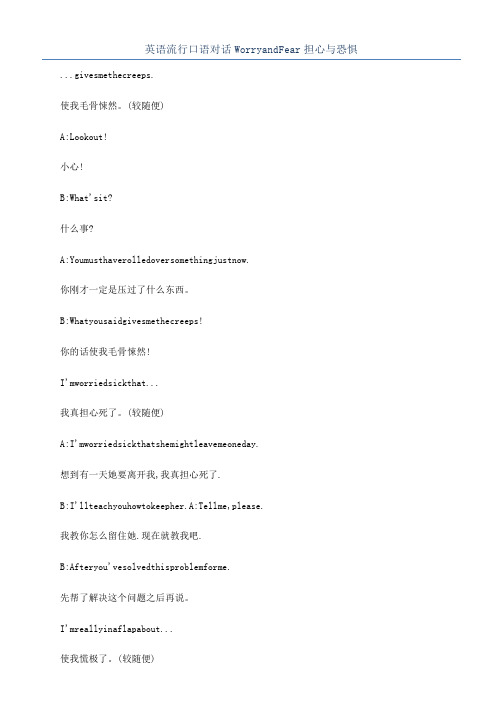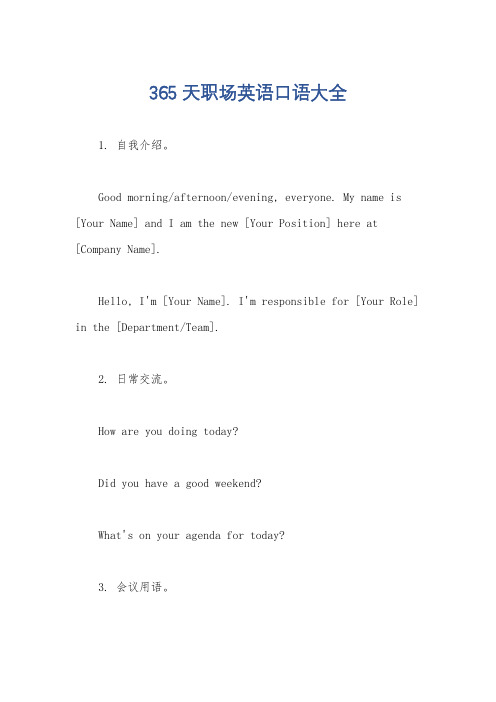365天交际口语详解09担心与忧虑
英语流行口语对话WorryandFear担心与恐惧

Youfrightenedmetodeath,
真是把我吓死了。(通用)
A:Stayingoutallnight,youfrightenedmetodeath.
你整夜不回家,真是把我吓死了。
B:Istayedwithmyfriends.
我和朋友们在一起了。
A:Youshouldatleastgivemeacall.
别担心.你已经做好了充分的准备。
A:I'minsuchaneedofthejobthatIcan'taffordanymistakes.
我太需要这份工作了.我可不能犯什么错.
B:I'msureyou'llpassit.
我相信你会通过的。
I'mscaredthat...
我担心......。(较随便)
我担心她可能不回来了。
我担心......。(通用)
A:I'mworryingthatshemaybelost.
我担心她会这迷路。
B:Berelaxed.She'sfamiliarwiththearea.
放心,她很熟悉这个地方。
A:Afterall,she'sa5-year-oldkid.
她毕竟只是个五岁的孩子。
B:OK.I'llgooutandlookforher.
英语流行口语对话WorryandFear担心与恐惧
...givesmethecreeps.
使我毛骨悚然。(较随便)
A:Lookout!
小心!
B:What'sit?
什么事?
A:Youmusthaverolledoversomethingjustnow.
高中英语 365天交际口语详解(9) 担心与忧虑Part1 惯用单句详解素材

365天交际口语详解(9):担心与忧虑Part1--惯用单句详解人们每天都在担心与忧虑当中度过,担心自己、担心他人、忧虑这个世界…但这又有什么用呢,拿出实际行动来,才能有助于解决自己、他人和这个世界上的问题,哪怕只能解决一点点,也是有意义的。
详解惯用单句担心与忧虑第1节态度表达第1章态度意愿一想到面试我就心慌。
I’m really in a flap about the interview.★ flap n. 慌乱(状态)我感觉如坐针毡。
I’m on ten terhooks.= I’m on pins and needles.★ tenterhook n. 张布钩● on tenterhooks = on pins and needles“焦虑不安”我愁得睡不着觉。
Worrying kept me awake.★ awake a. 醒着的我心乱如麻。
I’m a bundle of nerves.● a bundle of nerves“神经极度紧张的人”我在想会是什么事。
I wonder what it could be.○ I gue ss something came up. 我猜肯定发生什么事了。
我很担忧。
I’m really anxious.= I’m very worried.★ anxious a. 忧虑的,担心的我再也受不了了。
I can’t take it anymore.= I can’t bear it anymore.= I can’t deal with this anymore.= I can’t take another problem.你的所作所为让我很担心。
I’m anxious about what you did.= What you did makes me anxious.= I feel great anxiety about what you did.★ anxiety n. 忧虑,焦虑,担心(其形容词为anxious)我静不下心来。
口语365

我很乐观。
I`m quite optimistic.我对你有信心。
I have confidence in you.我们能行。
We can do that.很简单。
It`s easy.会好起来的。
it will work out.一切都会好的。
Everything will be fine.明天又是另外一天了。
Tomorrow is another day.没什么可担心的。
There`s nothing to worry about.我们一定会成功的。
We`re bound to be successful.毫无疑问,我们会赢的。
There`s no doubt we will win.我很有把握我们能羸。
I`m quite sure we will win.我是个乐观主义者。
I`m an optimist.我面对一切都好乐观。
I face everything cheerfully.我对未来充满希望。
I`m hopeful about the future.Being OptimisticJohn: Do you think he`ll get promoted this time around?Mary:Why not?I have every confidence in his promotion.He works hard and deserve it.John:Really?It looks to me more like he`s just good at getting along with everyone.Mary: Partly,but he is also very hardworking and creative.He knows how to make the customers happy too.John:But I`ve been working hard.I feel like I should get the promotion.Mary:Maybe you should.You do work hard.John:I feel good about my chance for getting it.I`m quite optimistic.Mary:That`s exactly how you need to think.You can do it.John:Thanks to the optimism.It feels good to hear people say nice things somethings.。
365天英语口语大全(日常口语篇 交际口语篇)【完整版】

家庭生活1起床早起三部曲,穿衣叠被加洗漱——日复一日,年复一年。
最难的是第一步,瞧瞧Jim,都几点了,还赖在床上不起呢。
该起床了。
It’s time to get up.○Get up!起床!○Wake up!醒一醒!快起床。
Get up soon.= Get out of the bed quickly.我星期六通常晚起。
I usually sleep late on Saturdays.●sleep late“晚起”快点儿!Hurry up!= Hurry!时间还早呢。
It’s still early.○It’s too early to get up.现在起床太早了。
闹钟响了吗?Did the alarm go off?○Did you hear the alarm?你听到闹钟响了吗?★alarm [] n.闹钟(相当于alarm clock)●go off“响起,发出声音”我一夜没睡着。
I stayed up the whole night.= I spent a sleepless night.★sleepless [] a.失眠的,不眠的●stay up“不睡觉,熬夜”我还很困。
I’m still sleepy.○I want to sleep 10 more minutes. 我想再睡10分钟。
★sleepy [] a.困倦的,欲睡的你昨天晚上打呼噜了。
You were snoring last night.★snore [] v.打鼾我整晚都在做梦。
I’ve been dreaming all the night.○I had a very good dream last night. 我昨晚做了个好梦。
把衣服穿上。
Put your clothes on.= Get dressed.★dress [] v.(给)穿衣把被褥叠好。
Fold up your bedding.○Fold up your quilt. 把被子叠好。
365天英语口语大全(日常口语篇)

第一章家庭生活第一节日常起居1 起床该起床了。
It’s time to get up。
快起床。
Get up soon。
我星期六通常晚起。
I usually sleep late on Saturdays。
快点儿!Hurry up!时间还早呢。
It’s still early。
闹钟响了吗?Did the alarm go off?我一夜没睡着。
I stayed up the whole night。
我还很困。
I’m still sleepy。
你昨天晚上打呼噜了。
You were snoring last night。
我整晚都在做梦。
I’ve been dreaming all the night。
把衣服穿上。
Put your clothes on。
把被褥叠好。
Fold up your bedding。
把头发梳一下。
Comb your hair。
Waking Someone UpAnn:Hey, Jim, it’s time to wake up and get out of bed。
Jim:Do I have to get up now?Ann:You’d better get up, or you’ll be late。
Jim:What are you talking about? My alarm hasn’t even gone off yet.Ann:Yes, it did. It went off 30 minutes ago. You slept right through it. You’re like a dead person while you sleep。
Jim:I must have slept right through it。
Ann:Rise and shine! Sleepyhead!Jim:Just let me sleep 5 more minutes。
Ann:The early bird gets the worm。
2019年中考英语常考对话情景之关心和焦虑的交际用语

2019年中考英语常考对话情景之关心和焦虑的交际用语
各位读友大家好,此文档由网络收集而来,欢迎您下载,谢谢
关心和焦虑的交际用语
1、What‘s wrong/the matter。
?表示的意思是“你怎么啦?”、“你有什么不舒服?”、“出了什么毛病?”,用来询问对方的疾病、痛苦、忧伤、事故等情况,。
句中的wrong作“失常的”、“状况不佳的”,matter作“麻烦事”、“毛病”、“故障,指病痛或事故的原因。
”
What‘s wrong with。
和What’s the matter with。
?两个句子意思相同,可以互换。
2、Is there anything the matter?意思是“出了什么事吗?”、“有什么毛病吗”这个句子还可以简化为:anything the matter?
3、We are anxious/worried about。
“be anxious/worried about”意思是“为担心”,可用于各种时态,其中的be可用get代替
4、There is no need to be worried。
没有必要担心。
/ There is nothing to worry about。
没有什么可以担心的。
对于别人的担心或焦虑,常可以用以上句子表示宽慰。
各位读友大家好,此文档由网络收集而来,欢迎您下载,谢谢。
高中英语 365天交际口语详解(10) 害怕Part3 360°文化洗礼素材

365天交际口语详解〔10〕:害怕Part3--360°文化洗礼
胆小如“鸡〞与“chicken out〞
美国俚语中,“chicken〞可用来表示“胆小的〞,常用的一个和“chicken〞有关的习语是:chicken out。
“c hicken out〞的意思是:原来计划好做一件事,但是到最后一刻却害怕了,感到完成不了,于是便中途停止或放弃,也可以说是临阵退缩。
这种事情几乎每个人都在不同情况下经历过…
Today I was sure I could work up my courage and dive off the ten meter board at the pool. I walked right out to the edge, but then I chickened out—it looked like a long way down to the water!
我原来以为今天我肯定会鼓足了勇气从游泳池那个十米高的跳台上跳下去。
可是,当我走到跳台边缘的时候却退缩。
从跳台到水面的距离看起来好远啊!
下面再来看一个例子:
My friend Joe was planning to get married for the fourth time. But at the last moment he chickened out because his first three marriages ended in divorce and he was afraid to take another chance.
我的朋友乔原来准备要第四次结婚。
可是,到了最后一刻他胆怯了,因为他结过三次婚,最后结局都是离婚,所以他怕这次又会不成功。
365天职场英语口语大全

365天职场英语口语大全1. 自我介绍。
Good morning/afternoon/evening, everyone. My name is [Your Name] and I am the new [Your Position] here at [Company Name].Hello, I'm [Your Name]. I'm responsible for [Your Role] in the [Department/Team].2. 日常交流。
How are you doing today?Did you have a good weekend?What's on your agenda for today?3. 会议用语。
Let's get started, shall we?I'd like to call this meeting to order.Does anyone have anything to add before we move on?4. 提出建议。
I suggest we consider an alternative approach.Have we thought about trying it this way?Maybe we could explore other options.5. 谈论工作进展。
We're making good progress on the project.The sales numbers are looking very promising.We've encountered a few challenges, but we're working on solutions.6. 处理问题。
We seem to have run into a bit of a snag.I think we need to address this issue as soon as possible.Let's figure out a solution to this problem.7. 谈论目标和计划。
- 1、下载文档前请自行甄别文档内容的完整性,平台不提供额外的编辑、内容补充、找答案等附加服务。
- 2、"仅部分预览"的文档,不可在线预览部分如存在完整性等问题,可反馈申请退款(可完整预览的文档不适用该条件!)。
- 3、如文档侵犯您的权益,请联系客服反馈,我们会尽快为您处理(人工客服工作时间:9:00-18:30)。
365天交际口语详解(9):
[担心与忧虑Part1--惯用单句详解]
人们每天都在担心与忧虑当中度过,担心自己、担心他人、忧虑这个世界…但这又有什么用呢,拿出实际行动来,才能有助于解决自己、他人和这个世界上的问题,哪怕只能解决一点点,也是有意义的。
详解惯用单句
担心与忧虑
第1节态度表达
第1章态度意愿
I'm really in a flap about the interview. 一想到面试我就心慌。
flap n. 慌乱(状态)
I'm on tenterhooks. 我感觉如坐针毡。
= I'm on pins and needles.
tenterhook n. 张布钩
on tenterhooks = on pins and needles“焦虑不安”
Worrying kept me awake. 我愁得睡不着觉。
awake a. 醒着的
I'm a bundle of nerves. 我心乱如麻。
a bundle of nerves“神经极度紧张的人”
I wonder what it could be. 我在想会是什么事。
I guess something came up. 我猜肯定发生什么事了。
I'm really anxious. 我很担忧。
= I'm very worried.
anxious a. 忧虑的,担心的
I can't take it anymore. 我再也受不了了。
= I can't bear it anymore.
= I can't deal with this anymore.
= I can't take another problem.
I'm anxious about what you did. 你的所作所为让我很担心。
= What you did makes me anxious.
= I feel great anxiety about what you did.
anxiety n. 忧虑,焦虑,担心(其形容词为anxious)
I can't calm down. 我静不下心来。
I can't control myself. 我控制不住自己。
I can't relax. 我放松不下来。
control v. 控制
I'm going nuts. 我快要疯了。
= I'm going crazy.
nuts a. 发狂的,发疯的
[担心与忧虑Part2-对话详解及文化洗礼]
详解实用对话
Worry
Rose:Has Alan shown up? yet?
Jack:No, not yet. I guess something came up?. He’ll call soon enough to let us know what’s going on. He’s good that way.
Rose:I wonder what it could be.
Jack:I don’t know. I hope it’s nothing serious.
Rose:Last week his sister was admitted to the hospital.
Jack:What happened?
Rose:She was in a serious car accident. She was hurt pretty badly. They thought she was going to die.
Jack:How is she now?
Rose:She fell into a coma?... The doctors aren’t too hopeful. But I hope they’re wrong.
Jack:Poor? Alan. He’s going nuts. His sister is all he has left; his parents died last year.
Rose:Yes, he has been through a lot in the last year. I hope his luck changes soon. Maybe his sister will pull through?.
担忧
罗丝:艾伦露面了吗?
杰克:没有,还没露面。
我猜肯定发生什么事了。
他应该会打电话告诉我们的。
要是那样就好了。
罗丝:我在想会是什么事。
杰克:我也不知道。
希望不是什么严重的事情。
罗丝:上星期他姐姐住院了。
杰克:怎么回事啊?
罗丝:他姐姐出了车祸,伤得很严重。
他们都觉得她快不行了。
杰克:那她现在怎么样?
罗丝:她已经昏迷了。
医生觉得没有太大希望了。
不过我希望他们的判断是错的。
杰克:可怜的艾伦。
他都快要发疯了。
他姐姐可是他惟一的亲人了,他父母去年刚去世。
罗丝:是啊,他去年经历得太多了。
我希望他能时来运转。
也许他姐姐能挺过来呢。
详细解说
“show up”的意思是“露面,出席”,例如:Uncle George didn't show up for our wedding because he forgot. (乔治叔叔没有来参加我们的婚礼,因为他忘了。
)
“come up”的意思是“发生”,例如:I'll let him know if anything
comes up. (如果发生什么事,我会告诉他的。
)
“fall into a coma”意为“陷入昏迷状态”。
单词“poor”在对话中的意思是“可怜的”,例如:How's your poor father? (你可怜的父亲怎么样了?)另外“poor”还可以表示“贫穷的”,例如:My family used to be poor. (我家过去很穷。
)
“pull through”的意思是“度过难关,恢复健康”。
单词
wonder v. 想知道,对…感到惊讶
admit v. 接纳,允许进入
accident n. 意外事故
hurt v. 伤害,(使)受伤,(使)疼痛
coma n. 昏迷
FUN 轻松:贴士
寻找中国人错误英语的根源
英国语言学家艾利斯认为母语干扰是导致第二语言学习者出现错误的主要原因。
母语干扰主要表现为负向迁移,即学习者在一种语境中学会的知识会干扰在另一种语境中的学习。
中国学生学英语也是如此。
英汉两种语言的文化背景、表达习惯、句型结构以及词汇的运用等方面各不相同,所以中国的英语学习者因受汉语的影响,经常会说出一些“中国式英语”。
[担心与忧虑Part3--360°文化洗礼]
“worry”的由来
The dog is worrying the rat.
如果你看到这句英文,并尝试着将它翻译成中文:“那条狗正在烦那只老鼠”时,恐怕就要贻笑大方了。
这句话正确的翻译应该是:那条狗正在撕咬那只老鼠。
你可能会一头雾水,“worry”是烦扰的意思,怎么会和“撕咬”(tear up)联系起来了呢?
事实上,“worry”一词来源于古英语“wyrgan”,有“扼杀”之意,上面这句话中的“worry”即取此意,是指动物“撕咬”它的猎物。
后来“wyrgan”又渐渐发展成中世纪英语的“ worien”,意思也演变为“strangle(抑制,束缚)”。
随着历史的变迁,“worry”这个词“攻击性”的意味大大削弱了。
在中世纪英语中的“worien”保留了其前身“wyrgan扼杀”的意思,并衍生出一个新意思“用牙齿咬住喉咙并且撕裂”或“咬住并来回甩动以杀死或伤害”。
到16世纪,“worry”开始含有“以粗暴手段或袭击方式来骚扰”、“口头攻击”的意思。
到了17世纪,这个词产生了“干扰、使焦虑和烦扰”的意思。
19世纪时,这个词义又向前发展了一点,也就是我们现在经常见到的“使感到焦虑或痛苦”和“感到烦恼或不安”。
